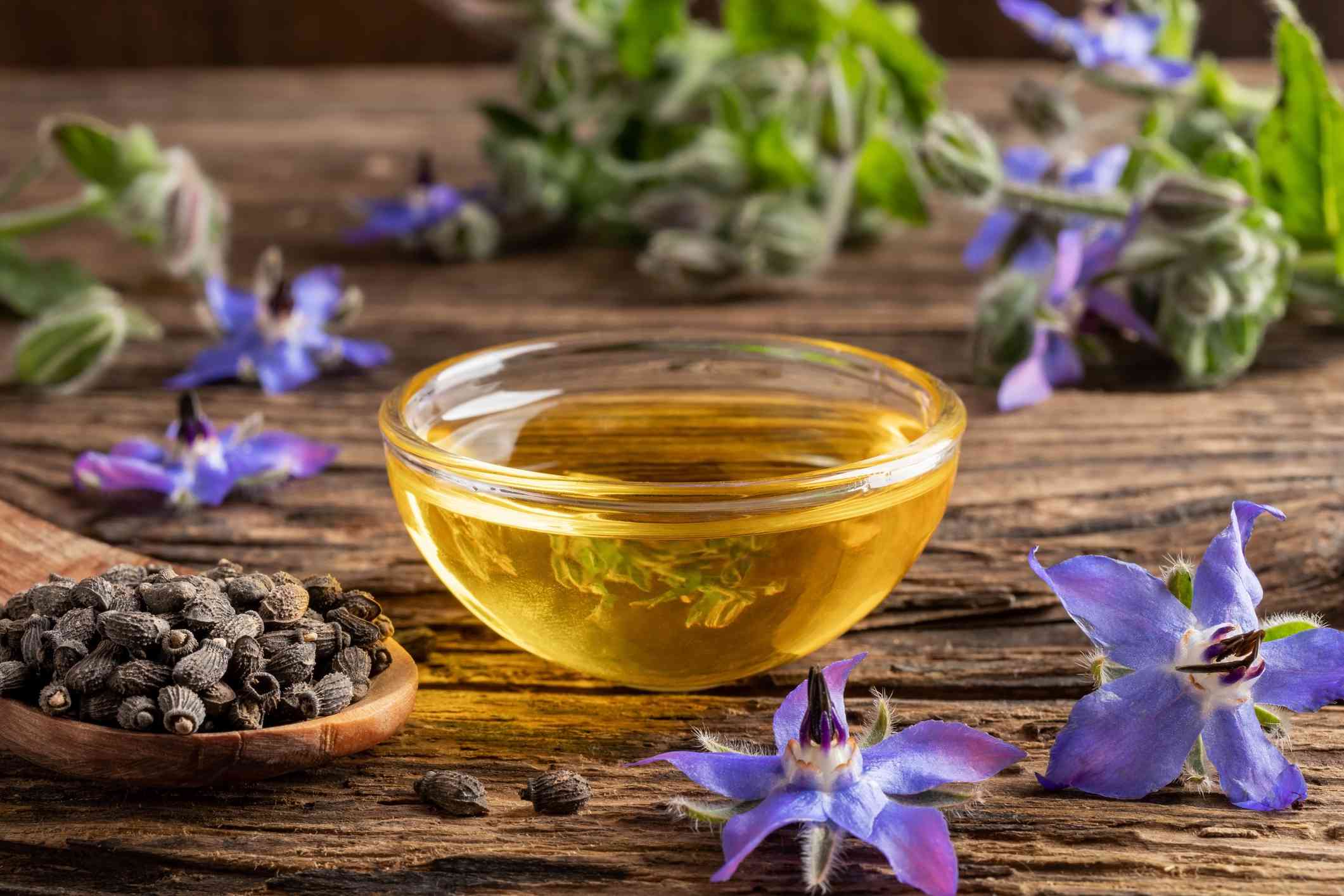
:max_bytes(150000):strip_icc():format(jpeg)/GettyImages-1181619589-5c7eaa4205d04e2b8a002d611c3ec02c.jpg)
Borage is an herb from the Borago officinalis plant, which grows across the Middle East, Mediterranean, and North Africa. Seeds of the plant contain gamma-linolenic acid (GLA), an omega-6 fatty acid with anti-inflammatory properties.
Borage has traditionally been used to treat conditions like depression, fever, respiratory infection, and adrenal insufficiency. Today, it’s a potential treatment option for several skin and inflammatory conditions.
Borage helps with inflammation by lowering the production of interleukin (IL) and tumor necrosis factor (TNF), two proteins that play a key role in inflammation. Borage also helps create prostaglandin E1 (PGE1), a product that helps to limit inflammation in the body. As a result, borage may help treat or manage health conditions that involve inflammation.
Here are some examples:
- Rheumatoid arthritis (RA) is an inflammatory autoimmune disease that occurs when the immune system attacks healthy tissue. One study found that 1.4 grams of borage daily for six months helped improve RA symptoms by 37%. Another study found that taking 2.8 grams (g) of borage daily for six months improved RA symptoms by 64%.
- Asthma causes lung and airway inflammation. Some research suggests that borage may help treat and prevent asthma symptoms from worsening by decreasing airway inflammation and swelling. However, other studies reported that doses of 2 grams daily for 12 months did not appear to improve asthma symptoms compared to a placebo (a treatment with no active drug or therapeutic benefit).
- In one study, adults with moderate asthma received 5 milliliters (mL) of a compounded borage supplement three times daily for one month. They experienced less coughing, shortness of breath, sleeping issues, asthma flare-ups, and emergency room visits. The supplement did not appear to improve labs related to inflammation caused by asthma.
More research is needed to understand how beneficial borage may be in treating and preventing inflammatory conditions.
The anti-inflammatory effects of borage may help manage certain skin conditions. Omega-6 fatty acids, found in borage, support the structure and function of the skin. Using borage oil topically may improve and normalize the skin barrier function. Direct application to the skin may also treat pain, bruises, and wounds.
Acne is a common skin condition that leads to skin lesions like pimples. In mild to moderate acne, taking 2 grams of borage daily (which provides 400 milligrams GLA) for 10 weeks decreased inflammatory acne lesions by 33% and non-inflammatory acne lesions by 16%. Acne severity improved after 10 weeks of use.
Atopic dermatitis (AD) is an eczema that causes dry, itchy skin. Data conflicts on whether borage is an effective treatment. Studies that used borage doses of 500-4,000 milligrams (mg) daily for up to 24 weeks did not conclude that the supplement significantly affected the AD.
More research is needed to understand the possible benefits of useful borage to treat skin conditions.
Research has evaluated borage in preventing and treating cardiovascular (heart and blood vessel) conditions. Several studies have found that borage may help lower triglycerides, increase high-density lipoprotein (HDL) cholesterol (“good” cholesterol”), and decrease blood pressure and blood clotting effects.
One study in adults ages 30-46 with overweight or obesity evaluated borage oil’s effect on multiple cardiovascular conditions:
- Study participants took four capsules of a borage oil supplement (880 milligrams of GLA) daily for six weeks.
- Borage oil did not improve overall resting metabolism or body mass index (BMI), but it appeared to improve triglyceride and HDL levels. (However, participants had normal lipid and cholesterol levels to begin with.)
- Researchers concluded that borage oil likely does not directly support weight loss but may help with triglycerides and cholesterol levels.
Another study evaluated the benefits of various fatty acid-based dietary supplements in people with early-stage type 2 diabetes or metabolic syndrome:
- Participants received either corn oil, fish oil, or a borage oil combination for 8 weeks.
- Those who received borage oil saw a decrease in total cholesterol from 182 milligrams per deciliter (mg/dL) to 171.9 mg/dL and LDL cholesterol from 106.3 to 96.8 mg/dL.
Another study evaluated the use of borage oil in postmenopausal women with hypertension (high blood pressure):
- Participants received 1 gram of borage oil plus vitamin E or vitamin E alone for six months.
- The group taking borage oil plus vitamin E had an average decrease in systolic blood pressure, from 138.75 millimeters of mercury (mmHg) to 127 mmHg, and decreased diastolic blood pressure (from 89.88 mmHg to 83.50 mmHg).
- The vitamin E-only group experienced a smaller decrease, about 131 mmHg in systolic blood pressure and no difference in diastolic blood pressure.
- The study found a reduced waist-hip ratio but no significant change in overall weight or BMI.
You can take borage by mouth or apply it directly to your skin. Borage oil is available as an oil or as a softgel capsule.
GLA omega-6 fatty acids are found in the oil of the borage seed. Oil pressed from the seeds often contains about 18-26% GLA. The flowers of the Borago officinalis plant may be eaten, but they do not contain GLA.
Dosage
There are no established dosage recommendations for borage. Available research has used doses of up to 4 grams daily. It’s best to follow the dosing instructions on the supplement label or ask your healthcare provider for guidance.
Borage is considered safe in adults in doses of up to 4 grams daily for 12 weeks. In children, borage is safe in doses up to 2 grams daily for 12 weeks.
There is not enough evidence to determine if borage is safe in people who are pregnant or lactating. If you are pregnant or lactating, you should not take borage supplements.
Borage plants and products contain pyrrolizidine alkaloids (PAs), which are known to be hepatotoxic (toxic to the liver). PAs are mostly found in the borage plant root but can also be found in the flowers, leaves, and seeds. When shopping for borage supplements, look for products labeled as “hepatotoxic PA-free.”
When buying a supplement, make sure the product is third-party tested. The U.S. Food and Drug Administration (FDA) does not regulate supplements the same way as medications, which means supplement quality and safety can vary. Third-party testing confirms the supplement contains the ingredients listed on the label and is free from harmful contaminants. Check for seals from reputable organizations such as NSF International, U.S. Pharmacopeia, or ConsumerLab.
Potential Drug Interactions
Available research suggests borage does not interact with many medications. However, there are a few potential drug interactions, including:
- Blood thinners and antiplatelets: Taking borage with blood thinners and antiplatelets may increase your risk of bleeding. GLA, found in borage, appears to lower how much platelets clot by about 45% and increases bleeding risk. Prescription blood thinners and antiplatelets include Coumadin (warfarin), Plavix (clopidogrel), and Eliquis (apixaban). Herbs and supplements with blood thinning and antiplatelet ability include ginkgo, dong quai, and turmeric.
- Medications induced by CYP3A4: Taking borage with drugs that are metabolized by the liver enzyme CYP3A4 may increase PA levels and the risk for liver damage. To avoid this interaction, avoid taking products that are not PA-free. Examples of medications induced by CYP3A4 include phenytoin, phenobarbital, and corticosteroids.
- Phenothiazines: Several studies in the 1980s reported that taking borage oil with phenothiazines may increase your risk for seizures. Phenothiazine is a group of medications used to treat mental and emotional disorders, such as prochlorperazine, fluphenazine, and chlorpromazine. However, many other studies have disproved this claim.
- Pyrrolizidine alkaloid-containing herbs and supplements: Due to the risk for liver toxicity, borage should not be taken with other PA-containing herbs and supplements. Examples of these supplements include black cohosh, garcinia, turmeric, and vitamin A.
Can You Take Too Much?
The maximum dosage of borage has not been reported. Doses up to 4 grams daily have been reported safe. More research is needed to determine if certain doses of borage can cause significant side effects or issues.
Borage is generally well-tolerated. Common side effects reported with borage products include bloating, belching, and diarrhea.
Borage plants and some borage products contain PAs, which are known to cause liver damage. Consistent exposure to PAs can lead to a condition called veno-occlusive disease (VOD). VOD happens when the blood vessels in or around the liver are blocked. Symptoms of VOD include pain in the epigastric area, vomiting, diarrhea, ascites (build-up of fluid in the abdomen), and hepatomegaly (enlargement of the liver).
When shopping for borage supplements, look for products labeled as “hepatotoxic PA-free.”
Borage is an herb found in the Borago officinalis plant. Its seeds contain GLA, an omega-6 fatty acid believed to lower inflammation. The herb is a potential treatment option for some skin and inflammatory conditions, including rheumatoid arthritis, acne, and asthma.
Talk with your healthcare provider about taking borage oil. They can help you determine if the supplement is appropriate for you based on your health conditions and any other medications you are taking.







